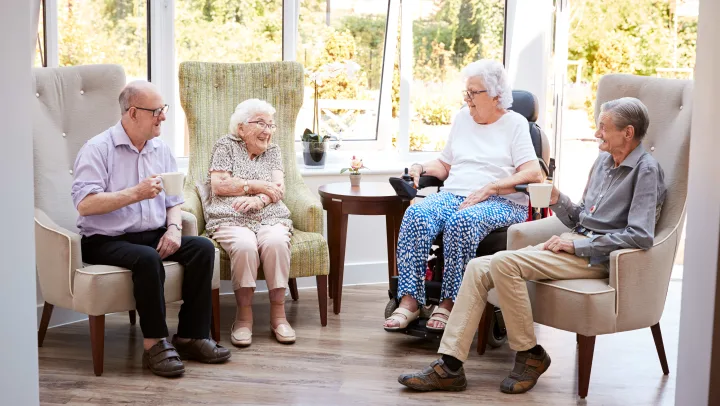The Importance of a Comprehensive Program of Treatment in Assisted Living Setups
In helped living setups, the execution of a comprehensive program of treatment is essential for resolving the complex requirements of citizens. By focusing on individualized care plans and involving households in the process, these programs can significantly improve wellness end results and quality of life.
Recognizing Comprehensive Treatment Programs
As assisted living facilities proceed to advance, comprehending comprehensive care programs becomes vital for both locals and their family members. Comprehensive care programs are developed to deal with a variety of needs for people residing in aided living atmospheres, making sure that each resident obtains tailored assistance that reflects their distinct health and wellness problems and way of life choices.

Moreover, comprehensive care programs highlight coordination amongst various carriers, guaranteeing smooth communication between caregivers, clinical workers, and relative. This incorporated approach not only boosts the top quality of treatment but additionally cultivates a supportive neighborhood atmosphere. Family members play an important function in this process, taking part in treatment planning and ongoing conversations to ensure that the local's needs are consistently satisfied. Recognizing these programs is vital for making educated decisions about treatment choices and maximizing the lifestyle for locals in assisted living centers.
Benefits for Citizens

(Dementia Care Charlotte)One key benefit of detailed treatment is the enhancement in health results. Routine monitoring and coordinated treatment assistance in the early detection and management of chronic conditions, minimizing hospitalizations and emergency situation treatments. Homeowners profit from boosted social involvement, as organized tasks and programs cultivate a sense of neighborhood, dealing with sensations of seclusion and solitude.
Furthermore, homeowners experience enhanced assurance, recognizing that professional support is readily available ought to they call for aid. This assurance permits them to concentrate on appreciating their day-to-day activities and preserving purposeful partnerships.
Role of Caretakers
Caretakers play a critical duty in the health of locals in nursing home, making certain that their needs are met concern and expertise. They act as the key factor of call for homeowners, providing essential assistance in everyday tasks such as showering, dressing, and medicine administration. Their presence not just advertises physical health but also improves emotional and social wellness by cultivating connections improved count on and understanding.
In addition to supporting daily living jobs, caretakers are important in keeping track of adjustments in residents' health and behavior. They are educated to recognize subtle indications of distress or decline, enabling prompt treatments that can stop complications. Their expertise of each local's one-of-a-kind background and choices permits them to deliver individualized treatment, improving the total quality of life.
In addition, caretakers act as supporters for locals, interacting their needs and choices to various other medical care specialists and member of the family. This advocacy is vital in creating an all natural treatment atmosphere that appreciates the self-respect and autonomy of each person. Eventually, the devotion and ability of caregivers are necessary elements of a comprehensive program of care, underpinning the success of assisted living setups.
Customizing Care Program
While every local in assisted living has distinct needs and choices, customizing care strategies is vital to providing effective and individualized support. A one-size-fits-all technique to care can overlook essential aspects of private health, potentially causing suboptimal results. Memory Care. As a result, a thorough assessment of each resident's wellness standing, personal background, and way of living choices is paramount in creating customized treatment techniques.
The modification procedure entails cooperation among health care experts, caregivers, and relative. By incorporating input from all stakeholders, care plans can resolve not just medical demands however also emotional and social variables that add to total high quality of life. Routine testimonials and updates to these plans guarantee that they stay pertinent as locals' problems and choices evolve with time.
(Dementia Care Charlotte)In addition, tailored treatment plans advertise a sense of self-respect and freedom among residents, fostering an environment where they feel valued and appreciated. This personalized method not only boosts the efficiency of care however likewise strengthens the connection in between caretakers and citizens, producing a helpful community ambience. Inevitably, purchasing customized treatment preparation is a cornerstone of supplying top notch assisted living solutions that satisfy the varied needs of locals.
Enhancing Neighborhood Involvement
Building on the foundation of personalized care strategies, boosting community interaction is an essential aspect of improving the this article general experience for residents in assisted living (Assisted Living). Active involvement in community activities cultivates social connections, battles feelings of isolation, and adds to emotional wellness. Helping with opportunities for citizens to participate in team activities, such as art courses, horticulture, and exercise sessions, produces a comprehensive setting that advertises communication and partnership
Moreover, integrating residents right into the broader area via partnerships with regional companies can supply improving experiences, such as volunteering and participating in social events. This not only helps locals feel valued yet additionally strengthens ties with the bordering community, boosting their sense of belonging.
Moreover, motivating family involvement in neighborhood tasks is crucial. Memory Care. Member of the family can act as essential support group, assisting to connect the gap between citizens and the neighborhood. Regular household occasions and open forums for conversation foster transparency and partnership, making sure that the treatment setting remains responsive to the demands of all stakeholders
Conclusion
In verdict, detailed care programs in assisted living settings play a crucial duty in maximizing homeowners' health. By attending to clinical, emotional, and social demands, these programs not just enhance quality of life but also advertise very early discovery of health and wellness problems, lowering the probability of hospitalizations. The participation of families in treatment preparation reinforces support networks, fostering a sensible and independent living setting. Ultimately, such programs add substantially to the general health and wellness end results and satisfaction of locals.